Multiple Subplots
Contents
12. Multiple Subplots¶
%matplotlib inline
import matplotlib.pyplot as plt
plt.style.use('seaborn-white')
import numpy as np
12.1. plt.axes: Subplots by Hand¶
我們可以自己畫出兩個 axes
ax1 = plt.axes() # standard axes
ax2 = plt.axes([0.65, 0.65, 0.2, 0.2]) # [left, bottom, width, height]
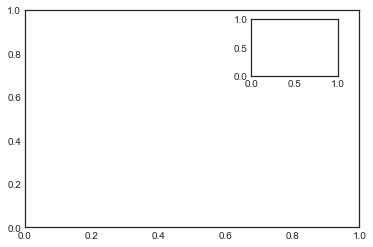
這邊解釋一下, [left, bottom, width, height] = [0.65, 0.65, 0.2, 0.2] 的意思
在一張圖中,左下角在座標系統是 (0,0),所以 left 和 bottom,就像是座標系的 x 和 y 的意思。至於 widht 和 height,是指從新圖的 (x,y)開始算,要往右多寬,往上多高的意思
對應到 oop,我們可以用
add_axex的指令來新增 axes。例如,我要建立2個垂直堆疊的 axes
fig = plt.figure()
ax1 = fig.add_axes([0.1, 0.5, 0.8, 0.4],
xticklabels=[], ylim=(-1.2, 1.2))
ax2 = fig.add_axes([0.1, 0.1, 0.8, 0.4],
ylim=(-1.2, 1.2))
x = np.linspace(0, 10)
ax1.plot(np.sin(x))
ax2.plot(np.cos(x));
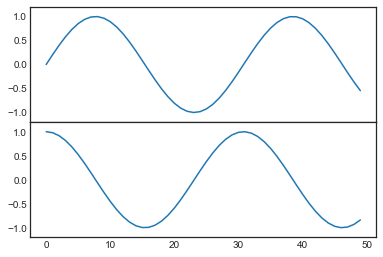
可以看到,這張圖經過巧妙的設計:
下面那個 pannel,y從 0.1開始,height又是 0.4,所以圖的最上面,剛好到 0.5
上面那個 pannel,就讓他從 bottom = 0.5 開始畫。然後,再把他的 xticklabels 拿掉,那兩張圖就疊在一起了
12.2. plt.subplot: 用 grid 來畫圖¶
用
plt.subplot(幾列, 幾欄, 這張圖是第幾張圖)來規定好,現在這張圖所在的 grid 的位子把圖片塞進格子時,都是 byrow 的塞
舉例來說,我如果想畫出 2x3 的 grid,然後把圖片畫進去,我可以這樣做
for i in range(1, 7):
plt.subplot(2, 3, i)
plt.text(0.5, 0.5, str((2, 3, i)),
fontsize=18, ha='center')
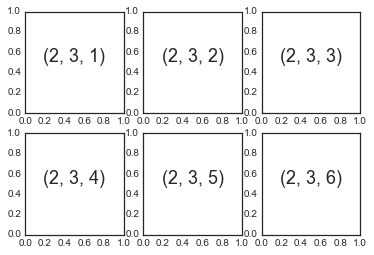
The command
plt.subplots_adjust可以用來調整間距.剛剛的做法,是
plt.subplot(),那如果是用 oop,對應的寫法就是fig.add_subplot()
fig = plt.figure()
fig.subplots_adjust(hspace=0.4, wspace=0.4) # height 的 space 是子圖形的 40%, width 的 space 也是 40%
for i in range(1, 7):
ax = fig.add_subplot(2, 3, i)
ax.text(0.5, 0.5, str((2, 3, i)),
fontsize=18, ha='center')
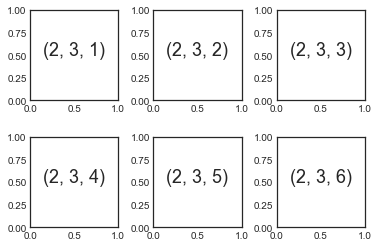
12.3. plt.subplots: 一次準備好整個網格¶
我們剛剛是用 for 迴圈,在每個回圈中,都要寫
plt.subplot(幾列, 幾欄, 這是第幾個圖)來一張一張的做出格子和畫圖。那這還蠻煩的,如果你的格子點非常規律,那我可以用
plt.subplots()直接一次做完就好。我們接下來要建立一個 2x3 的子圖表,然後我要他們 share x 軸 和 y 軸,作法如下:
fig, ax = plt.subplots(2, 3, sharex='col', sharey='row')
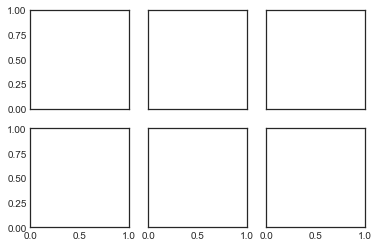
可以看到,當你
srarex和sharey後,就自動移除不必要的刻度和label了。那現在的
ax物件,他已經是個二維陣列,所以我們可以用 for 回圈,依序加入我要的圖:
# axes are in a two-dimensional array, indexed by [row, col]
for i in range(2):
for j in range(3):
ax[i, j].text(0.5, 0.5, str((i, j)),
fontsize=18, ha='center')
fig
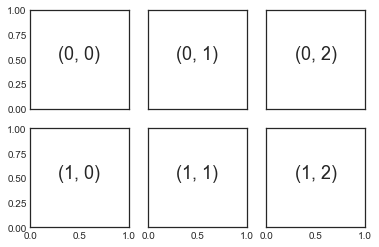
可以看到,比起
plot.subplot(),現在的plt.subplots()更符合 python 的以 0 為基底的索引慣例
12.4. plt.GridSpec: unregular grid¶
直接看範例
grid = plt.GridSpec(2, 3, wspace=0.4, hspace=0.3)
現在這個 grid,他就是個二維list,layout 長成 2x3 的樣子
plt.subplot(grid[0, 0]) # grid 的 0,0 就是右上角的格子
plt.subplot(grid[0, 1:]) # grid 的 0, 1~2,就是格子的 (0,1) 和 (0,2) 這兩格都給他
plt.subplot(grid[1, :2]) # grid 的 (1,0) 和 (1,1) 都給他
plt.subplot(grid[1, 2]); # grid 的 (1,2) 給他
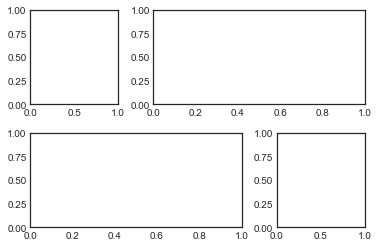
實際的應用如二維散布圖,然後margin我想畫 histogram
# 先生成資料(二維常態)
mean = [0, 0]
cov = [[1, 1], [1, 2]]
x, y = np.random.multivariate_normal(mean, cov, 3000).T
# Set up the axes with gridspec
fig = plt.figure(figsize=(6, 6))
grid = plt.GridSpec(4, 4, hspace=0.2, wspace=0.2)
main_ax = fig.add_subplot(grid[:-1, 1:])
y_hist = fig.add_subplot(grid[:-1, 0], xticklabels=[], sharey=main_ax)
x_hist = fig.add_subplot(grid[-1, 1:], yticklabels=[], sharex=main_ax)
# scatter points on the main axes
main_ax.plot(x, y, 'ok', markersize=3, alpha=0.2)
# histogram on the attached axes
x_hist.hist(x, 40, histtype='stepfilled',
orientation='vertical', color='gray')
x_hist.invert_yaxis()
y_hist.hist(y, 40, histtype='stepfilled',
orientation='horizontal', color='gray')
y_hist.invert_xaxis()
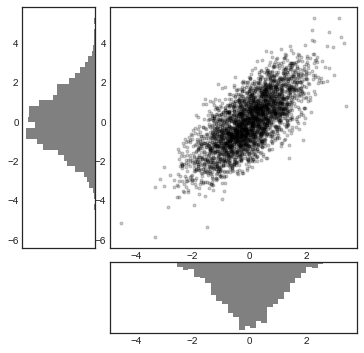
其實,這種圖,在 seaborn 中很好畫,不用這麼累,晚點就會介紹了
